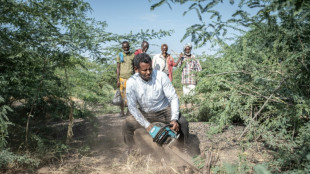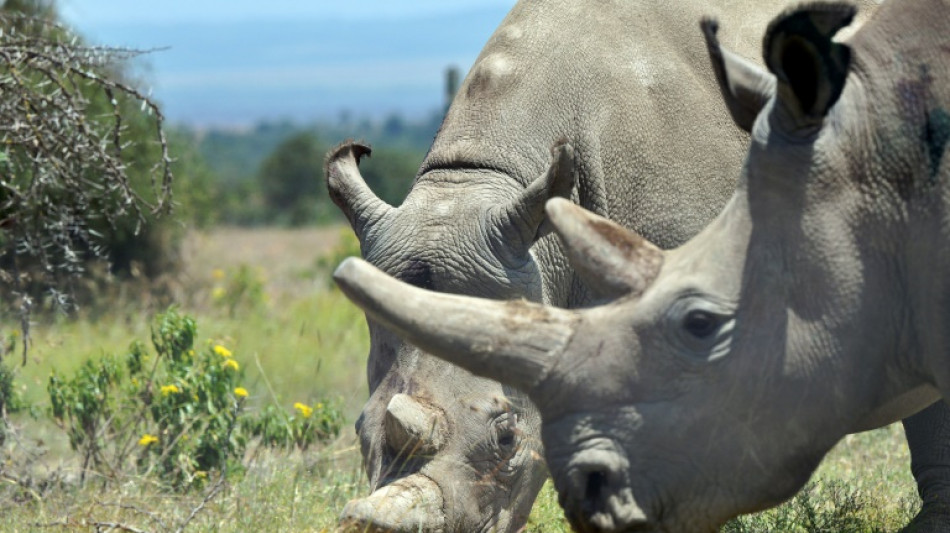
-
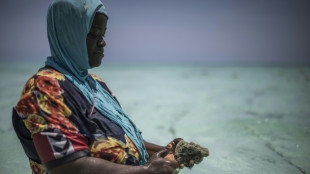 Zanzibar women turn to sponge farming as oceans heat up
Zanzibar women turn to sponge farming as oceans heat up
-
Stocks rise with focus on Fed, tech as US government reopens

-
 Curry lifts Warriors over Spurs, Thunder rout Lakers, Jokic shines
Curry lifts Warriors over Spurs, Thunder rout Lakers, Jokic shines
-
Mushroom material takes on plastic packaging at Belgian start-up
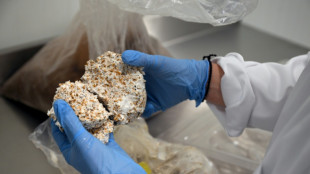
-
 India's top tennis player says denied China visa
India's top tennis player says denied China visa
-
In Kyrgyzstan, world's largest natural walnut forest thins away
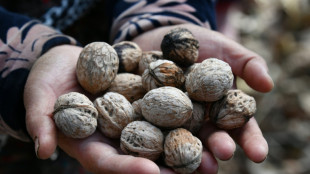
-
 TV soaps and diplomacy as Bangladesh and Turkey grow closer
TV soaps and diplomacy as Bangladesh and Turkey grow closer
-
Striking Boeing defense workers to vote on latest contract

-
 Australia's opposition ditches commitment to net zero emissions
Australia's opposition ditches commitment to net zero emissions
-
Duffy takes four as New Zealand crush West Indies to seal T20 series

-
 South Korea halts flights for college entry exam
South Korea halts flights for college entry exam
-
Trump signs bill to end record-breaking US shutdown

-
 EU lawmakers to vote on unpicking green business rules
EU lawmakers to vote on unpicking green business rules
-
Smith says England speed kings could struggle in Ashes

-
 Stocks stutter with focus on Fed, tech after US reopen vote
Stocks stutter with focus on Fed, tech after US reopen vote
-
Record-breaking US shutdown ends as political fallout begins

-
 France marks decade since harrowing Paris attacks
France marks decade since harrowing Paris attacks
-
Skubal, Skenes win MLB Cy Young Awards for top pitchers

-
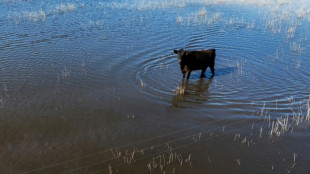 Record rains turn Argentina's farm-filled Pampas plains to wetlands
Record rains turn Argentina's farm-filled Pampas plains to wetlands
-
Solar storm brings new chance of vivid auroras, signal disruptions

-
 Gauff and Fritz back for United Cup against Swiatek's Poland
Gauff and Fritz back for United Cup against Swiatek's Poland
-
World's fossil fuel emissions to hit new record in 2025: study

-
 BMS Holdings Berhad Sets To Raise RM80.08 Million From Ace Market IPO Exercise
BMS Holdings Berhad Sets To Raise RM80.08 Million From Ace Market IPO Exercise
-
Empire Metals Limited Announces Appointment of Joint Corporate Broker

-
 US jury: Boeing owes $28 mn to family of Ethiopian Airlines crash victim
US jury: Boeing owes $28 mn to family of Ethiopian Airlines crash victim
-
G7 calls for urgent Ukraine ceasefire, de-escalation in Sudan

-
 Bayern stun Arsenal, Man Utd sink PSG in Women's Champions League
Bayern stun Arsenal, Man Utd sink PSG in Women's Champions League
-
New Epstein emails claim Trump 'knew about the girls'

-
 Brazil tribal chief ready to give Lula a 'talking-to'
Brazil tribal chief ready to give Lula a 'talking-to'
-
Clippers' Beal to have season-ending surgery - report

-
 Dow ends at record on hopes US government will reopen
Dow ends at record on hopes US government will reopen
-
Portugal's Ronaldo hoping Ireland fans boo him

-
 England set for Etihad start to Euro 2028 tournament campaign
England set for Etihad start to Euro 2028 tournament campaign
-
Sinner cruises past Zverev and into last four of ATP Finals

-
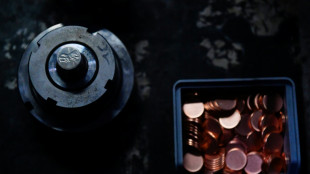 US presses final penny after more than 230 years
US presses final penny after more than 230 years
-
Baxter says England must be 'selfless' to see off All Blacks

-
 Pardoned French-Algerian writer Sansal arrives in Germany
Pardoned French-Algerian writer Sansal arrives in Germany
-
Bayern battle back to shock Arsenal in Women's Champions League

-
 China hopes US will 'some day' return to climate fold, official tells AFP
China hopes US will 'some day' return to climate fold, official tells AFP
-
Trump 'knew about the girls,' new Epstein emails claim

-
 Scotland 'optimistic' Russell will be fit to face Argentina
Scotland 'optimistic' Russell will be fit to face Argentina
-
Big platforms chart gradual path to self-driving at Web Summit

-
 Jane Goodall honored in Washington by conservationists including DiCaprio
Jane Goodall honored in Washington by conservationists including DiCaprio
-
Tuberculosis killed 1.23 million last year: WHO

-
 New Zealand coach Robertson says Twickenham visit is 'why I'm doing the job'
New Zealand coach Robertson says Twickenham visit is 'why I'm doing the job'
-
Hopes of US shutdown deal fail to sustain market rally

-
 US military personnel do not risk prosecution for drug strikes: Justice Dept
US military personnel do not risk prosecution for drug strikes: Justice Dept
-
Jailed writer Sansal on way to Germany after Algeria pardon

-
 Ukraine ministers resign over major corruption scandals
Ukraine ministers resign over major corruption scandals
-
Record-breaking US shutdown to end as political fallout begins


IVF breakthrough could revive nearly extinct rhino species
Scientists have carried out the first successful in vitro fertilisation of a southern white rhino, a major breakthrough that could pave the way to saving its highly endangered northern cousin.
Only two female northern white rhinos remain in existence but neither is capable of carrying a pregnancy to term.
To save the functionally extinct species, researchers from the scientific consortium Biorescue are attempting to implant a lab-grown northern white rhino embryo in a southern surrogate.
The ambitious reproduction programme is the last chance at survival for the northern white rhino species, whose last two members live at the Ol Pejeta Conservancy in Kenya under 24-hour guard to protect them from poachers.
The successful impregnation of a southern white rhino with an embryo of the same species was a "milestone", project leader Thomas Hildebrandt said at a press conference in Berlin.
"We achieved something that was not believed to be possible," Hildebrandt said.
The successful recent trial ended in tragedy when the bull and the surrogate, along with the foetus, were killed by an unrelated infection the scientists believe was caused by bacteria released by a mudslide in their enclosure.
The foetus was only 70 days old at the time but the team said they were confident it could have survived the 16-month pregnancy period.
The next step will see scientists try to repeat the feat with other embryos made with eggs harvested from the surviving females and sperm preserved from two long-dead males.
The team aims to "produce northern white rhino calves in the next two to two-and-a-half years", Hildebrandt said.
- Delicate operation -
To place the embryo in the surrogate, the team of conservationists use a sterile "teaser" bull rhino, whose approaches to the female indicate she is ready to conceive.
The team subsequently carry out the delicate operation in just under an hour with the surrogate under anaesthetic.
The size and delicate anatomy of the white rhinos means the embryo is implanted via the rectum into the uterus.
The trials were carried out using southern white rhino embryos to preserve what scarce genetic material is left from the northern species.
Biorescue has collected eggs from the surviving females, Najin and Fatu, since 2019 but had to retire the elder of the two from the programme in 2021.
The last male, whose name was Sudan, died at the sanctuary in Kenya in 2018.
What northern white rhino sperm has been preserved from now-dead male donors is of "very poor quality", said Cesare Galli from the Italian lab Avantea where the new northern white rhino eggs are fertilised in vitro.
- 'Big day' -
The Biorescue team have 30 fertilised eggs in freezers "waiting for their big day", said Susanne Holtze from the Leibniz Institute for Zoo and Wildlife Research.
The IVF method could potentially provide a model for other endangered species of rhino, such as the endangered Sumatran rhino in South East Asia, according to project leader Hildebrandt.
Rhinos, which have roamed the planet for 26 million years, have very few natural predators but their numbers have been decimated by poaching since the 1970s.
F.Schneider--AMWN
